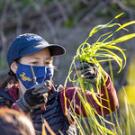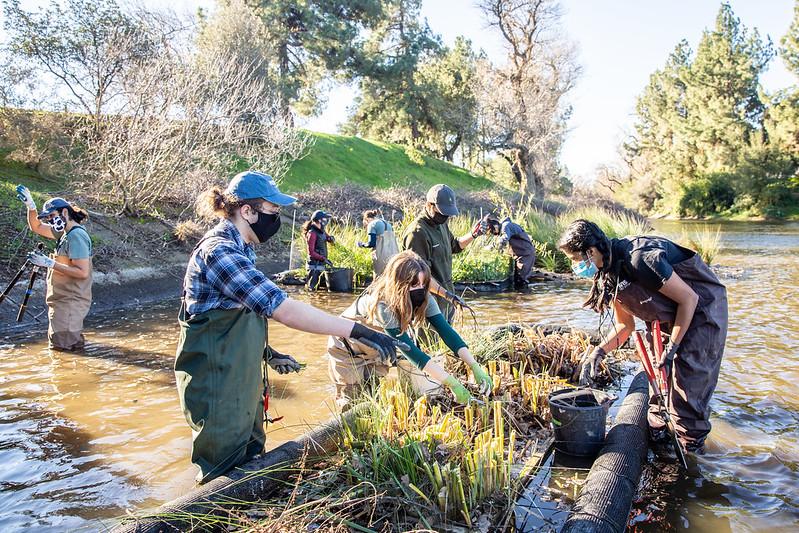
$5.4M Grant Awarded to UC Davis Arboretum and Public Garden
Funding Supports Completion of Flood Protection and Habitat Enhancement of Arboretum Waterway
Watch the Webinar about the Project

On Thurs., Feb. 24, 2022 we hosted a virtual meeting via Zoom for our community to ask questions and learn more about this transformational project.
Article updated June 29, 2023
A new $5.4 million grant from the California Natural Resources Agency will allow UC Davis to complete the Arboretum Waterway Flood Protection and Habitat Enhancement Project.
This new, two-year project builds upon a successful first phase, completed in 2018, that engineered waterflow and replanted native vegetation from the Wyatt Deck bridge, through the Redwood Grove, to eastern end of the Arboretum Waterway near Solano Park apartments. This new grant, coupled with $2.5 million in deferred maintenance funds from the university, will complete the waterway restoration from Lake Spafford (near Mrak Hall), to its western end, by the Equestrian Center.
The proposed project will remove the concrete banks that currently line the waterway's edges and replace them with gentle earthen banks which will be revegetated with native trees, shrubs and understory plants. Portions of the waterway will be narrowed, allowing for faster water movement. In addition, plans include the creation of floodplain benches and emergent marsh plantings, similar to those found in naturally occurring wetland habitats.


“We are ecstatic about this project,” said Kathleen Socolofsky, assistant vice chancellor and director of the Arboretum and Public Garden. "It has all come together thanks to many thoughtful years of planning and collaboration with faculty and other campus partners. The proof of concept for our overall plan is flourishing and now we can finish the transformation.”

The habitat enhancement portion of the project includes restoration and revegetation work carried out in partnership with the California Conservation Corps, as well as the Center for Land-Based Learning’s SLEWS (Student and Landowner Education and Watershed Stewardship) program.
“We look forward to completing this project with our community partners and our Learning by Leading™ internship program, as well as providing job training for our students and traditionally underserved communities” said Nina Suzuki, waterway steward.
Vice Chancellor Kelly Ratliff also gave thanks to the California Natural Resources Agency for the funding support.
"We successfully completed the first phase of the enhancement project in 2018, using campus funds managed for deferred maintenance in addition to community fundraising efforts for plants and programs that support the students who now help maintain the waterway. We’re thrilled that our early investment showed the state what was possible, and that they support our vision going forward,” Ratliff said.
Improvements will begin with the installation of recirculation pumps and wetland planting benches at Lake Spafford. The remainder of the waterway project will be constructed at the far west end, near the Oak Grove and Equestrian Center and will be followed by revegetation.
Regular updates will be posted online once construction begins. The public can stay up to date about his important project via the Arboretum and Public Garden's email newsletter, social media channels or by attending a virtual meeting on Feb. 24 at 7 p.m. (Learn more and register here.) The community can support the project through donations or by joining in a future community restoration event.
About the Arboretum Waterway
Starting in the 1870s, to prevent frequent flooding of local farms, the historic north fork of Putah Creek (including that area that is now the Arboretum Waterway) was diverted to the south of campus and the city of Davis. While many still refer to the Arboretum Waterway as Putah Creek, the water here no longer naturally connects to that system. Functionally, it’s the largest part of the UC Davis campus stormwater system – all rainfall eventually collects here before being pumped out to Putah Creek and flowing out to the Delta. Regionally, it serves as the centerpiece of the Arboretum, a campus and community amenity drawing those seeking recreation and relaxation as well as those interested in learning more about sustainable horticulture and environmental restoration. The Flood Protection and Habitat Enhancement project will continue to highlight and improve all these essential purposes.

Tell me more!
Get your wetsuit on and get ready for a deep dive! Click here to learn more about the Arboretum Waterway, this project and the Learning by Leading students that help maintain this important campus and community resource. Download graphics, read FAQs, donate and more!
